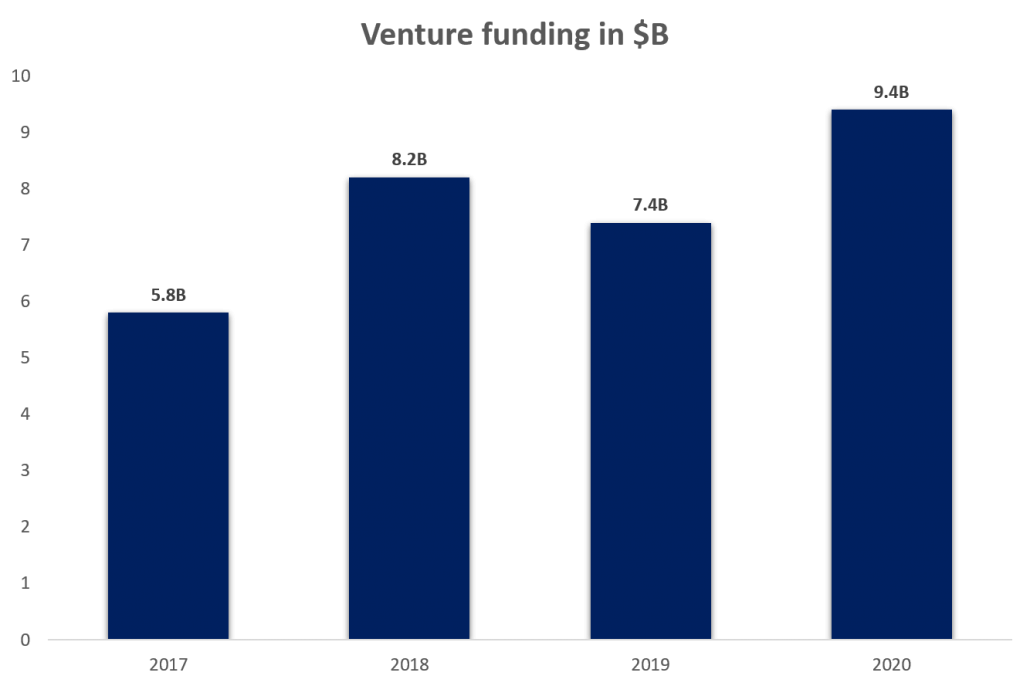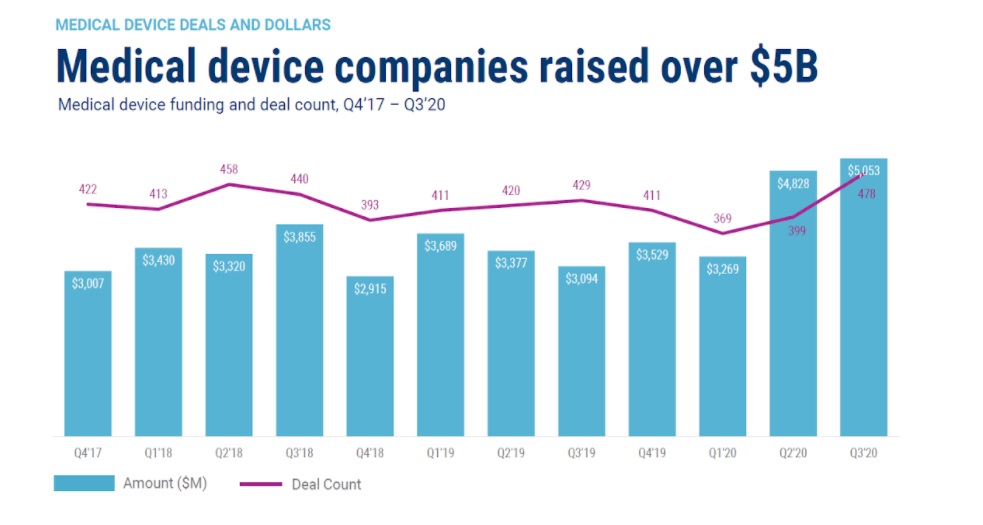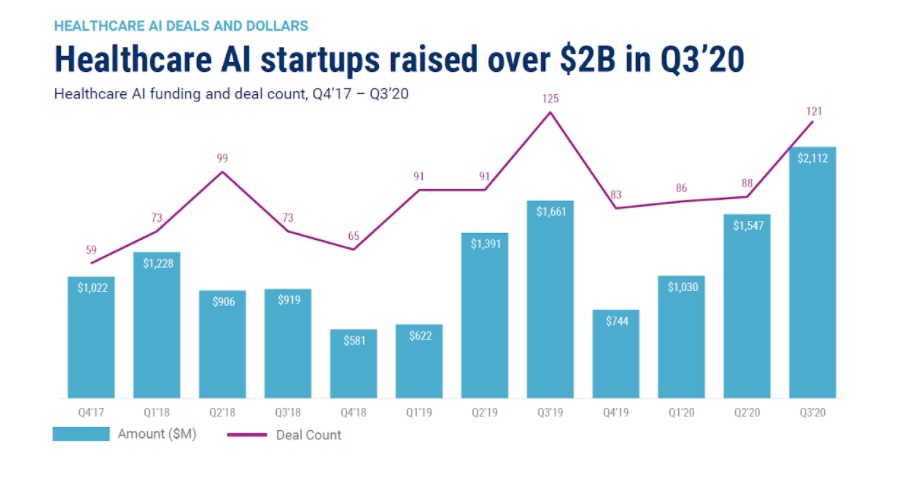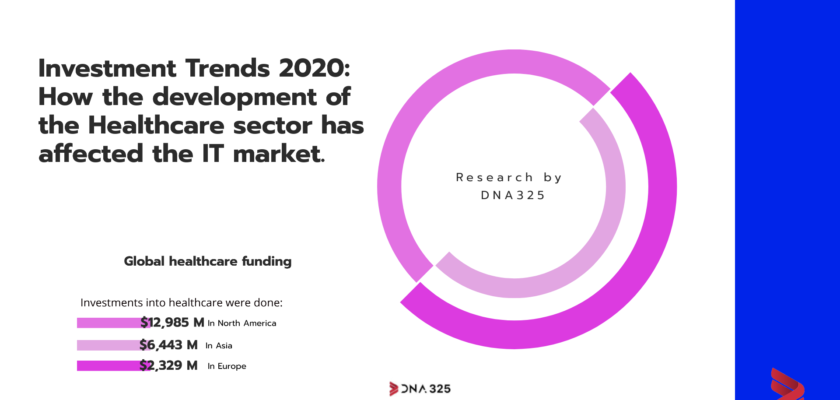Despite the economic volatility and COVID pandemic, most VCs managed to adapt to new ways of doing business. According to Crunchbase, there was an increase in investments between Q1 and Q3 2020 versus the same period in 2019 in healthcare, apps, payments, education, and gaming.
19 of the 25 largest early-stage VC deals were in the healthcare sphere. Rock Healthcare has made $4 B in funding for U.S. digital health startups. Mostly they were driven by investments into telehealth, late-stage rounds for R&D, and fitness tech companies. 2020 has become a boom funding year for digital health. Only in the US-based digital health startups, it was invested around $9,4 B.

Source: Rock Health Funding
Around twenty-four companies dealing with healthcare raised deals of $100M for Q3 of 2020. This tendency outreached the number of deals in 2018 when 12 mega deals were a record.
The rise in mega deals shows the trend towards capital concentration in digital health venture investment. Globally telemedicine companies have shown an increase in investments in Q3 2020 that is around $2.8M and before in 2019 it has been $692M. Regarding the current trends, investments into telemedicine will rise in 2021.

Source: CB Insight
Globally by Q3 2020 total investments into the healthcare sphere reached $21,8 M, that is 1539 deals.

Source: CBInsights
By region, most investments into healthcare were done in North America ($12,85 M). In Asia they were equal to $6,443 M, in Europe they were equal to $2,329 M, and around $45 M in the other regions.

Source: CB Insights
Asia showed almost 3x funding increase QoQ.

Source: CB Insights
Medical device companies raised over $5B by Q3 2020.

Source: CB Insights
In general, the healthcare industry has shown the following results for 2020:
- Global healthcare funding has demonstrated growth in 2020, Q3 has set a new record in both deals and dollars.
- North America, Asia, Europe showed an uptick quarter-over-quarter. Asia-based digital healthcare showed a triple funding increase.
- Investments into telehealth were up to $2.8B in Q3, which is 73% more than in Q2. Such a result was reached because of the top 5 deals, which took around $900M of total quarterly funding.
- Healthcare AI companies got more than $2B in equity funding.
- Women’s health funding increased almost twice by Q3. Deals in this sector raised as well, showing a 17% increase quarter-over-quarter.
Recently lots of investments have been done into artificial intelligence and machine learning in the healthcare sector. Such a tendency was connected with different reasons, like the growth of population, different diseases, and pandemic situations.
The future of healthcare, the future of machine learning and artificial intelligence is coming along. About $5bn were invested into AI & ML companies in 2016 and from that time the number of investments keeps growing. It is going to reach $6.6bn in 2021.
The mobile health market has started growing too as well as investments there. Its size is predicted to reach more than $300B by 2025. The popularity of mHealth is growing and changing because health trends and concerns are also being changed in the upcoming future. For instance, the number of people who have diabetes in the U.S is getting higher, the tendency to use mHealth apps to assist in diabetes care and its prevention will be one of the main therapy fields for mHealth app publishers. The global pandemic has also become a driver for mobile health.
Mobile apps have become important in the digitization of the healthcare sector. Lots of companies are adopting mHealth. They hire the most popular app development companies in order to build useful healthcare applications for their target user base. The main goal of every medical app is to provide more convenient communication between patients and healthcare service providers.
There are the most important healthcare apps which have become popular in 2020.
1. ACT.md
This app offers a variety of tools that let healthcare service providers observe and understand the whole picture of a patient’s requirements and manage them respectively with exact partners across the healthcare sector.
There are several key features for this app:
- individual healthcare plans;
- storage for medical files;
- tasks for health improvement and custom reminders;
- contacts of the care team;
- chat option with the healthcare team.
2. AirStrip
The mission here is to improve the general healthcare delivery using mobile solutions that connect hospitals with their patients across different factors including geographic, technology, workflow boundaries. App provides users with engagement and insight capabilities as well as with patient-centered care.
The main and key features of this app are:
- ability to get data in dynamic information;
- offer customized user experience as per clinical specialty, usage patterns, and workflows;
- all the relevant data is brought to the clinic’s in one location to provide a short resume about the patients’ health;
- it is used as a diagnostic aid to give the exact clinical information.
3. ClotMD
This healthcare app allows patients and healthcare service providers to manage the therapeutic use of warfarin on the smartphone. The app connects patients on anticoagulation medicine with healthcare providers. So they are able to communicate in real-time.
There are also some key features:
- built-in diet library;
- ability to manage different levels and dosing schedules;
- users can share their results with the other healthcare professionals;
- real-time alerts about the testing schedule and other appointments.
4. Doximity
This application allows users to get access to the largest medical professional networks which have over 70 percent of physicians.
The main features of this app:
- access to the largest search directory of U.S. clinical;.
- users can send their HIPAA faxes from anywhere;
- users can directly annotate your healthcare documents;
- users can see news about medicine.
5. Medici
Users can get in touch with medical professionals and doctors who are members of the Medici network for a set period of time. The main goal of this app is to reduce the costs of going to the hospital by providing online consultancy for users.
There are key features:
- users can get instant lab results and medical prescriptions;
- users can chat with professionals and ask any question;
- users can invite all doctors to network;
- users can also chat securely with their doctors.
The mentioned above healthcare applications take a strong position on the market. All those apps are updated very often, so the new features are updated all the time.
Healthcare AI startups raised over $2B in Q3 2020.

There are also examples of the Medtech startups which became popular in 2020.
1. Verge Genomics
This is one of the best healthcare startups which was found in 2015 in San Francisco, USA. Verge Genomics is co-founded by Alice Zhang and Jason Chen. It is mainly working on saving lives by streamlining the medical trial process. Every year billions of dollars are invested in testing drugs that do not bring any results. According to different researches, in order to successfully place a drug on the market, $1.3 B is spent on R&D and FDA approval. Verge Genomics applies a specific approach with the use of artificial intelligence to find out which drugs are more likely to succeed. Using that technology, the company plans to assist the pharma industry to determine in a short time which drugs to advance by FDA process and which are worth giving up as they are unlikely to succeed.
2. HealX
This medical startup was founded in 2014, in Cambridge, UK. This startup is working on new drugs and treatments for rare diseases using artificial intelligence. It applies AI to check the database with existing drugs to repurpose them for curing rare diseases. This startup has already brought successful results when the company developed a drug for Fragile-X in a short time. HealX used 80% less time to get to human trials than the average drug manufacturer. HealX is accepted to be one of the most innovative healthcare startups. Startup owns one of the most complicated databases for rare diseases.
3. Embleema
The startup was founded in 2017, in New York, USA. This startup has started a HIPAA compliant healthcare blockchain network that lets patients access and shares their medical records with researchers and physicians. This allows patients to consolidate data and profit as they share it with different entities. Patients can be paid in cryptocurrency if they use this platform and share their medical information with researchers.
4. BOA Biomedical
This startup was founded in 2018, in Massachusetts, the USA has a platform technology to find out rapid diagnosis and treatment of infectious diseases.
There are also 10 top medical startups founded in Ukraine or by Ukrainian entrepreneurs:
5. Liki24
The startup is a drug delivery service provider in Ukraine. It was founded in 2017. The founder is Anton Avrinsky. The total funding amount is $6 M. It is funded by 4 investors. The most recent ones are Genesis Investments and Horizon Capital.
6. Cardiomo Care
This startup is an AI-based remote patient monitoring solution to find out heart diseases at the early stage. It was founded in 2016. Founders are Ksenia Belkina, Roman Belkin. The total funding amount is $976.8 K. It is funded by 4 investors. Rockstart and Plug and Play are the most recent investors.
7. Esper bionics
This startup is working on the myoelectric wrist prosthesis, Esper Hand. It was founded in 2018. Founders are Anna Believantseva, Dmytro Gazda. The total funding amount is nondisclosed. It is funded by SMRK VC Fund.
8. Raccoon.World
This startup is a platform that is working on the development of a rehabilitation platform that helps people to get people after injuries and neurological diseases. It was founded in 2017. Founders are Alex Radovichenko, Svitlana Malovana The total funding amount is $2.5M. It is funded by 4 investors. The most recent ones are Silicon Valley Syndicate Club and QPDigital.
9. Altris.ai
These are the health tech startups that develop ophthalmology deep learning platforms for retinal diseases. It was found in 2017. Founders are Andrey Kuropyatnyk, Anton Velychko, Maria Znamenska. The total amount of investments is non disclosed.
However, which changes are going to happen in the healthcare sector in 2021?
In 2020 many companies were pursuing the goal to become a tech company as data. Computing has become crucial to everything we do. In 2021 every company will learn to become a healthcare company regarding the fact that safeguarding employees and customers is becoming a core requirement of doing business. Here are the trends where investments will be mostly done.
1. Safety measures
The trend will include enhanced biosecurity measures from sanitization stations to on-premises screening technology and quarantine measures at places where the staff is required and can’t work from home. Companies are going to invest in technology that will help to mitigate the danger for people, from health apps that monitor people’s activity and remind us to take breaks and exercise, do meditations, etc.
2. Virtual care and remote medicine
The demand for doctors is getting higher. Moreover, remote medicine is allowing professionals to get more patients for consultations. There are also fewer chances to get contaminated. That’s why investments are going to be made into telemedicine.
Also, they will be done into robotics and autonomous healthcare assistants which are able to work in hospitals or at people’s homes. This trend will also be more useful for people. As companion robots eliminate symptoms of loneliness and social isolation.
3. Genome and gene editing
Investments will be done into “precision medicine” where drugs will be customized to match the genetic profile of individual patients, making them more effective.
4. Data and AI drivers shift to better healthcare insurance and coverage
Pandemic 2020 has become costly for insurance companies. That’s why there will be increased reliance on AI-driven prediction tools to forecast where resources can be used most effectively.
Investments in the healthcare sector have been raised in 2020. A significant part of them was done by North America. The global pandemic has put its own trends. Healthcare apps along with healthcare startups started being more funded. However, regarding 2021 forecasts, investments into the healthcare sphere are going to rise again, as people will want to protect themselves from any further possible pandemics and to make lives more comfortable.



